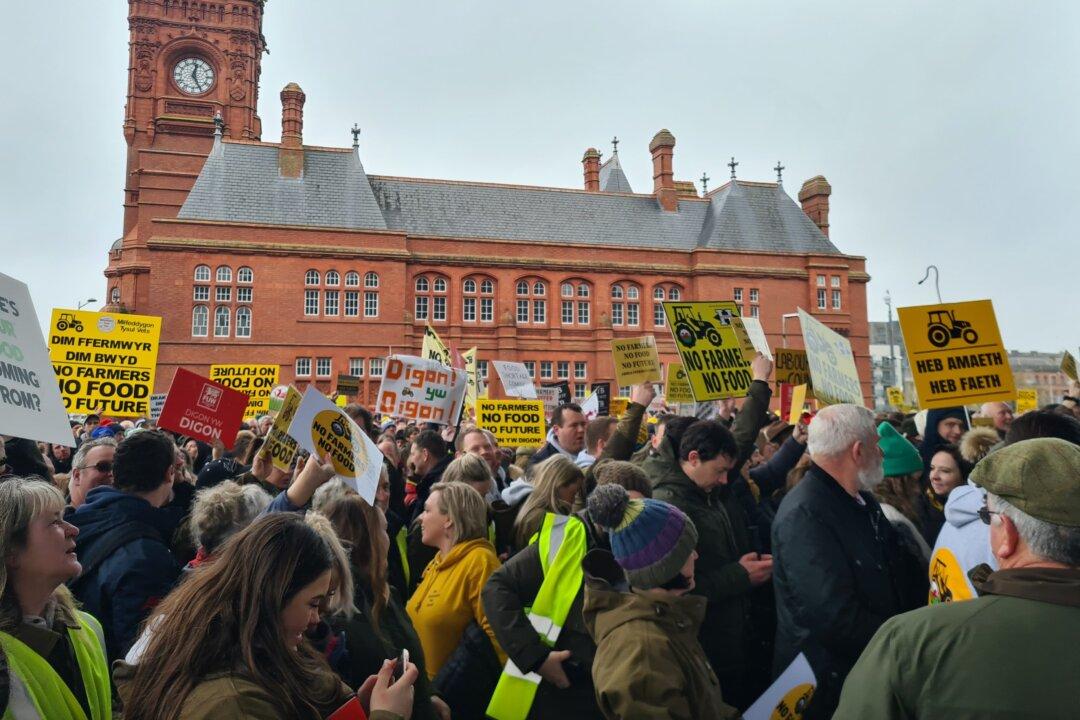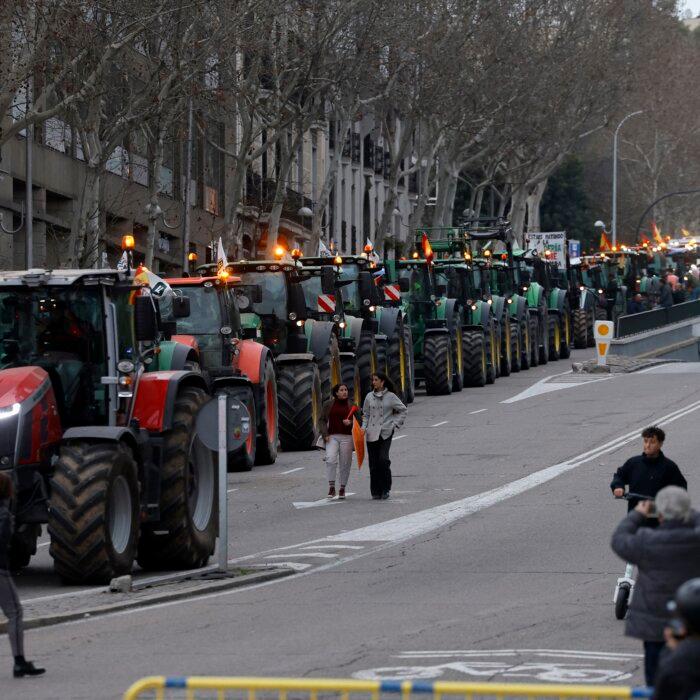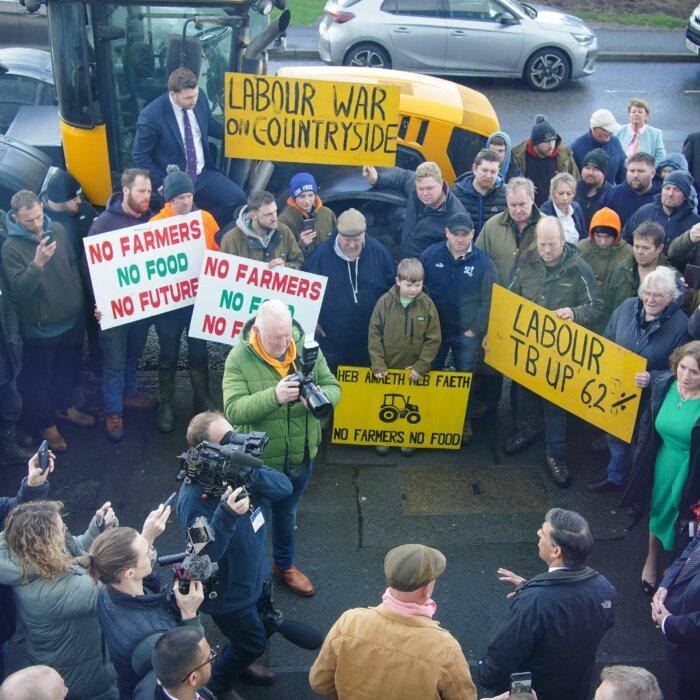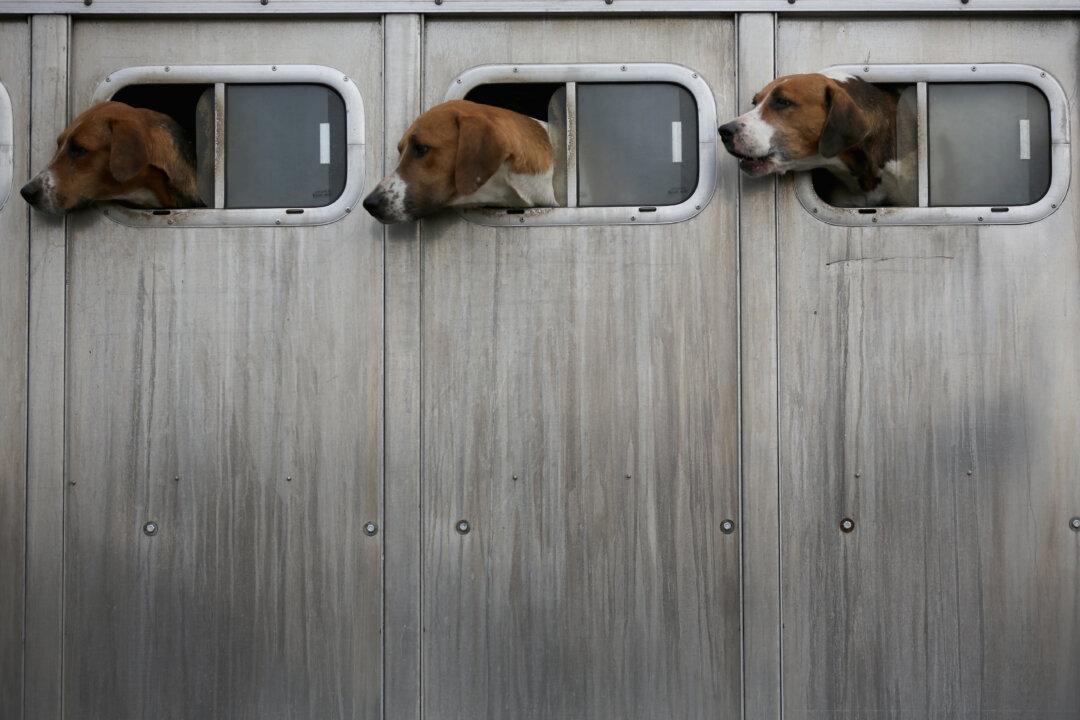CARDIFF—Thousands of farmers from across Wales converged on the Senedd in Cardiff on Wednesday, with many carrying placards reading “No Farmers, No Food,” to voice their concerns over critical issues affecting the Welsh agricultural sector, as the devolved Labour government is poised to introduce new regulations.
At the heart of the ongoing unrest is proposed changes to subsidies, which would mandate that farmers dedicate 10 percent of their land to forestry and another 10 percent to wildlife habitats. This move has sparked widespread concern among the farming community, with fears for farmers’ livelihoods and the broader agricultural landscape.
The protest brought together thousands of people, including members of the Senedd (MS), who gathered on the steps to hear grievances from a wide range of speakers.
Conservative MS for South Wales East, Laura Anne Jones, told The Epoch Times: “I think we can learn a lot of lessons from across the border … The UK government is in full support of us … they listen to farmers. We need to keep that pressure on.
“It’s really vital that they [the Welsh Government] start thinking about the next generation. There’s lots of young people here today, which is wonderful to see. But then they’re the ones who are going to be affected by this.
“Just 10 miles down the road, England have got such a good scheme where they give big grants, and we got little, you know, tiny little menial grants, and we’ve been told to cut food production on food production lands, when we want a sustainable nation.
“I think we’re seeing [farmers’] protests all over the place. Farmers just want a fair deal ... They want to be listened to and I think that that’s what every government needs to take into account across Europe.”
Andrew RT Davies, leader of the Welsh Conservatives, reminded those gathered, “You feed the nation,” echoing a sentiment from a group of predominantly Conservative MSs who promised to be the “voice in the community” for protesters.
During a meeting with protesters outside the Welsh Conservative Conference in Llandudno on Friday, Prime Minister Rishi Sunak engaged directly with leading protester and farmer Gareth Wyn Jones and his fellow campaigners, assuring them, “We’re going to do everything we can because we’ve got your back.”
Speakers outlined the three pivotal issues at the heart of the protests: the challenges posed by bovine tuberculosis (TB); regulatory burdens concerning nitrate management; and the complexities surrounding agricultural subsidies.
Ian Rickman, president of the Farmers’ Union of Wales, told the crowd: “There’s strength in unity, this isn’t about points scoring. Rural businesses rely on farmers; we’re in it together.”
The gathering also served as a platform for farmers to express their frustrations with what many in the crowd loudly decried as “climate lies,” highlighting the need for their voices to be heard to prevent their economic interest being put second to green ideology.
Amid chants from the crowd, consensus from the podium was that without consideration of farmers’ livelihoods, there would be no future to conserve.

Grievances Over Regulations
Grievances are deeply rooted in ongoing challenges with bovine TB, increasing regulatory pressures, and concerns over the implementation of sustainable farming schemes. Despite rigorous cattle testing and significant livestock losses, the Welsh farming community says that little progress has been made in combating TB, with many pointing to the need for a more balanced approach to wildlife management, particularly concerning badgers.Despite an increase in cattle testing there have been no gains in containing TB in 10 years, with just 3.2 cases in 1,000 in 2014 now moving up to 5 cases per 1,000 cows, according to the latest statistics.
Mr. Wyn Jones, a leading voice in the chorus of concerned farmers, took to the steps of the Senedd, saying: “I want to be positive because I want to see a future for my children on the land, farming and producing food … The general public understand that they’re going need a farmer once, twice, or three times every day of their lives.”
Movement Sees Online Traction
The British movement, galvanised partly through social media under the banner No Farmers, No Food (NFNF), has seen rapid growth, amassing nearly 60,000 followers on the X platform since its launch last month and gaining support from high-profile figures such as author Jordan Peterson and TV presenter Neil Oliver.In an interview with Farmer’s Weekly last Thursday, spokesman James Melville said, “No Farmers, No Food is purely about farming concerns and to try to get to a situation whereby British farmers’ best interests are being served with a bit more political will.”
Farmers are seeking to draw attention to critical issues such as the surging cost of fuel and fertilisers, exacerbated by global events like Russia’s invasion of Ukraine and the pressing demands of climate regulation.
A Welsh Government spokesperson told media: “Farming is very important to Wales and our economy and we want a successful future for Welsh farming.
“We have had a seven-year conversation with farmers to design future farming support and we are committed to continuing to work with farmers to develop the Sustainable Farming Scheme.
“This is a genuine consultation and no decisions will be taken on any element of the proposal, including how we achieve the requirement for habitat and trees, until we have conducted a full analysis of the consultation responses.
“We have been clear we expect changes to be made following the consultation, and we will continue to listen.”







